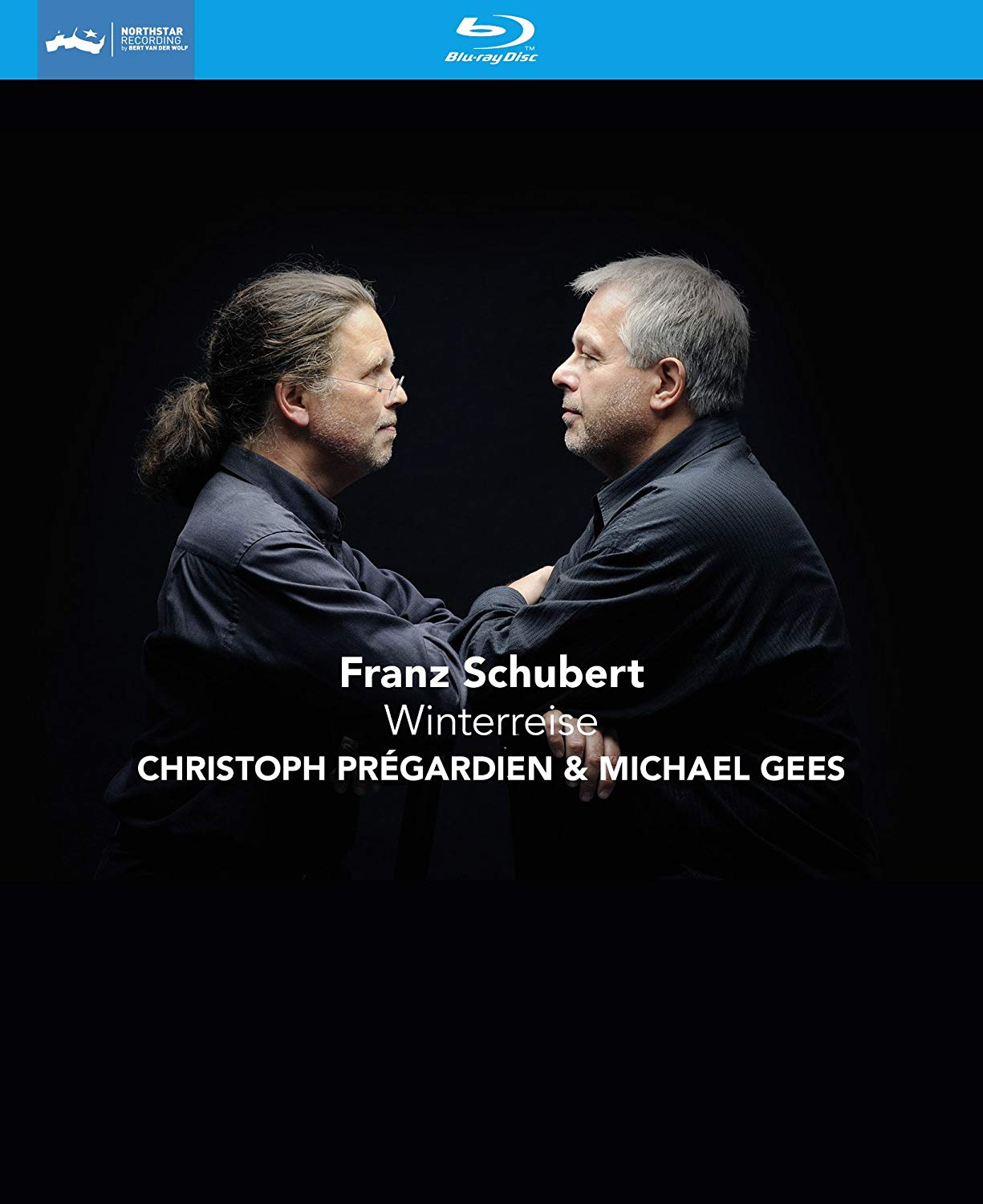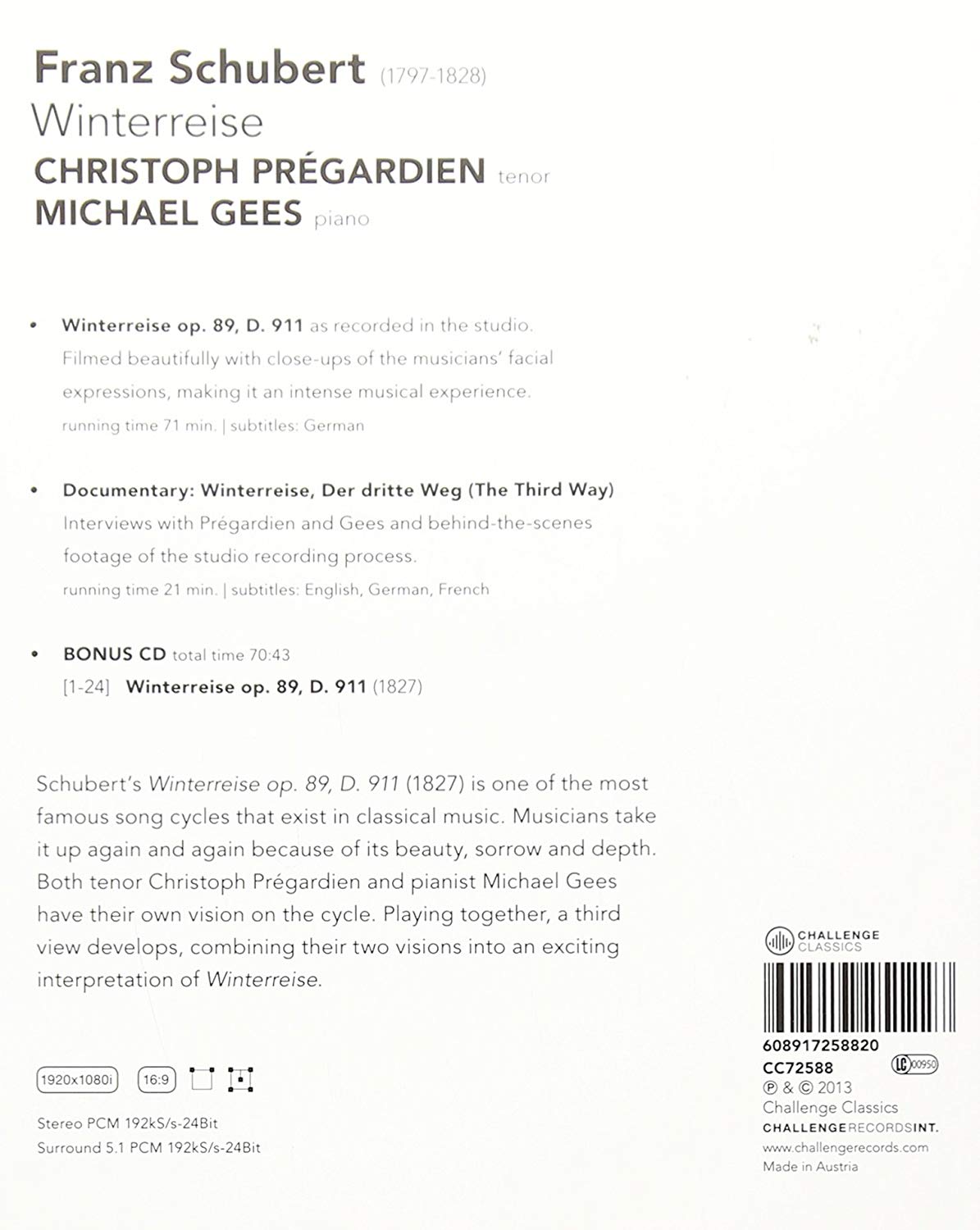

Schubert Winterreise song cycle performed 2012 by tenor Christoph Prégardien and Michael Gees on piano. Recorded in studio with multiple high-definition cameras; sound was recorded using 192kHz24 bit sound sampling. This is the most sophisticated sound technology used so far (2013) in any HDVD. (We also have a few titles with sound recorded at 96kHz24 bit.) Sung in German. The 71 minutes of music has subtitles in German only. There is a nice 21-minute behind-the-scenes documentary with subtitles in English, German, and French. Released 2013, disc has 5.1 PCM output. In addition, the Blu-ray package has a bonus CD with the music recorded at 44kHz16 bit. Grade: A+
During the last 6 years, the Blu-ray titles we have been getting have generally had far better video and sound than what was possible with DVD technology. Still, I have too frequently been dismayed when sound and video quality of our Blu-rays fell short of what current technology allows, especially in the field of classical music. Almost all of the limited top-notch classical music stuff (with 96kHz24bit sound and up-to-date video content) has been published in Japan by NHK for the home market or in the form of mostly demo recordings by AIX. But now, we have our first recording issued by a western company that exploits the state-of-the-art in both video and sound in a recording of major artists performing a substantial program of classical music of broad appeal to consumers! How did this finally come about? Obviously, recording two musicians in studio is a project that can be controlled carefully and handled with a relatively modest investment. Still, although I'm guessing, I think Prégardien gets the credit for insisting on making a recording as good as it can be! Let's hope other artists and conductors will follow suit and demand that their producers present them using the latest gear and techniques.
Now on to the performance. Of course, the singer is normally the dominant performer in a song recital because he has the words that tell the story. Prégardien chose to sing in studio using the cameras as audience. Like the Leierman whom we meet in the music, he will tell his story no matter what (images in black/white are from the bonus extra and the color pictures are from the performance). So I will not complain of the lack of a live audience. Prégardien doesn't need sheet music. Every word and note is burned into his soul:
Here's the studio and Gees, the accompanist:
Winterreise (Winter Wandering or Trek in Winter) is one mournful song that Schubert repeats, with substantial variations, 24 times over more than an hour. Each variation has its own name and is considered a separate song. Each song tells a different part of a story with text taken from 24 individual poems written by Wilhelm Müller (1794-1827) as a poem cycle. The tenor singing line can get monotonous, especially if you don't know enough German to follow the words. But Schubert wrote completely different piano music for each song. The accompanist on the piano plays a key role in contributing to the distinct character of each song. Here we see Gees with his sheet music, but he doesn't look at it much. With this life-preserver at hand, Gees concentrates on what he likes to do: to play the notes Schubert wrote in whatever manner strikes Gees' fancy at the moment:
And as Gees plays, according to recording producer Bert von der Wolf:
So in the Prégardien/Gees partnership, each can take the lead and neither dominates. The result is that no two performances of Winterreise by Prégardien and Gees will be the same. The words and notes will all be there, but the interpretations will be different.
Now (below) I'll show a few shots of Prégardien telling the story. Our young man of the song cycle must start on his winter wandering because his sweetheart has dumped him to marry a rich man. Love is a wanderer, and so must our hero also be, because God has made things that way:
Our hero leaves a note for his darling so she will know that on parting "I thought of you."
In Germany in winter, the nights last 16 hours. All is covered with snow and ice. Everything is cold except our hero's heart, which is glowing red hot:
When it doesn't seem to be dead:
Faithful to his darling, our hero wishes to die:
He sings, "I'll be better off in the dark":
Because Prégardien knows the material so well, nothing can fluster him. More comments about Prégardien from Van der Wolf:
The process of improvisation by both the singer and pianist keeps the performance interesting. According to Gees, neither partner has his own way:
So what's Winterreise all about? To Schubert, who knew he would soon die from syphilis, the wandering does lead to the grave. So traditionally, this work is sung as an orgy of self-pity. But that's too shallow a view. To Gees, the meaning of the work:
And Prégardien has a yet more optimistic view. This comes partly from our hero's encounter in the last song with the Leierman. Even this organ grinder, perhaps the most insignificant and pathetic figure ever created in verse or song, is indomitable in his heart. From this realization, our hero is inspired to try a fresh start. (And spring can't be too far away):
In the field of classical music, this recording is small scale and unpretentious. It's also impeccable and precious. In the past, I tried without success to even get through the Winterreise on LPs; this is the first recording of WR that I've been able to enjoy. So my enthusiasm for the recording is unbounded as far as newcomers to Schubert songs would be concerned. And I think that even "lieder lovers" and experts on the classical era will find a place for this along with the old recordings they love so much.
This Winterreise is, from the elitist point of view of this website, the best classical music recording ever produced outside of Japan. All you folks at Decca, DG, Sony, C Major, EuroArts, Accentus and the like — watch out. There may be more challenging video records coming soon to disrupt your markets! Grade: "A+"
OR
Update on 2013-09-10 by Henry McFadyen Jr.
There is one aspect of this Winterreise recording that deserves detailed discussion: the lack of subtitles for the text of the music in languages other than the native German. The package information makes it completely clear that the words of the song cycle are subtitled in German only. This is a nice feature since all the exact words of the poem appear and makes it easy to understand the singing in German. Because I speak German, I was happy with the German subtitles. The package information also makes it completely clear that only the documentary has subtitles in German, English, and French.
But others have commented that this title would have been more useful had the words of the poem been translated into English and French as well.
I checked with the ArkivMusic database and learned that about half of the older DVDs of this music have foreign-language texts of the poetry and the other records do not. So I don't think the lack of foreign-language text is a defect or error — it's the result of a business decision about what market to go for with the budget available to produce the recording. The German speaking market is pretty big. Non-German art-song lovers already have their favorite translations of Winterreise or they they have learned enough "lieder German" to understand the songs. So the folks at Challenge decided that the German and elite market was the best bet for them.
But why does the documentary have subtitles in English and French? First, it's relatively cheap to make on-the-fly translations of the casual conversations found in documentaries. And without foreign-language subtitles, non-German speaking customers must remain in the dark about the documentary.
On the other hand, English and French speaking customers can research the text of the poetry on their own. Finally, making or acquiring workable translations of poetry is hard, expensive, and fraught with all manner of difficulties, including copyright issues.
So I'm not going to change my A+ grade. But if you need a translation in a language you know well, there may be a good DVD for you. Learn the poetry that way; and then buy the Challenge version. Well, it's too bad this came up. Adding other translations possibly could have substantially increased sales for Challenge and could have given them a good return on the translation costs. But whether to try for this is a decision to be made by the suits, not by artists or critics.
Update on 2013-10-05 by Henry McFadyen Jr.
Richard Wigmore, a German Lieder expert who has auditioned many Winterreise recordings, praises the music on this Challenge Classics recording on page 99 of the 2013 Awards Issue of Gramophone. He says the interpretation and sound recording as a CD puts this in an elite group of recordings by Prégardian, Peter Schreier, and Mark Padmore. Wigmore also saw the DVD, but apparently doesn't think watching it is worth the trouble. Too bad he didn't see the Blu-ray, which probably would have made a bigger impression. It's good to know that a seasoned critic likes this recording compared to the scores of Winterreise records out there. So for someone who likes to see the performance, and especially someone who can benefit from the German subtitles on the HDVD, getting this Challenge Classics recording is a no-brainer.

















